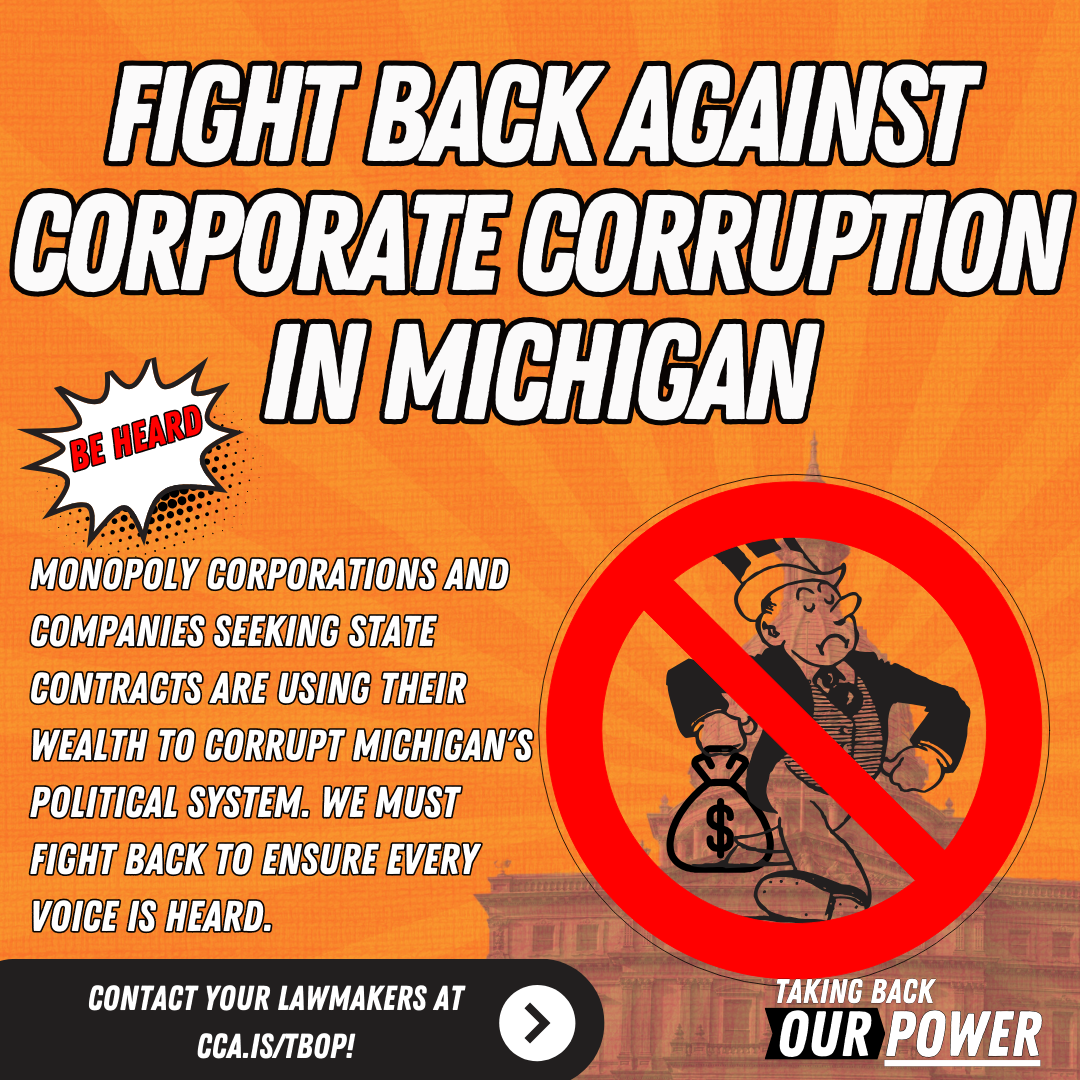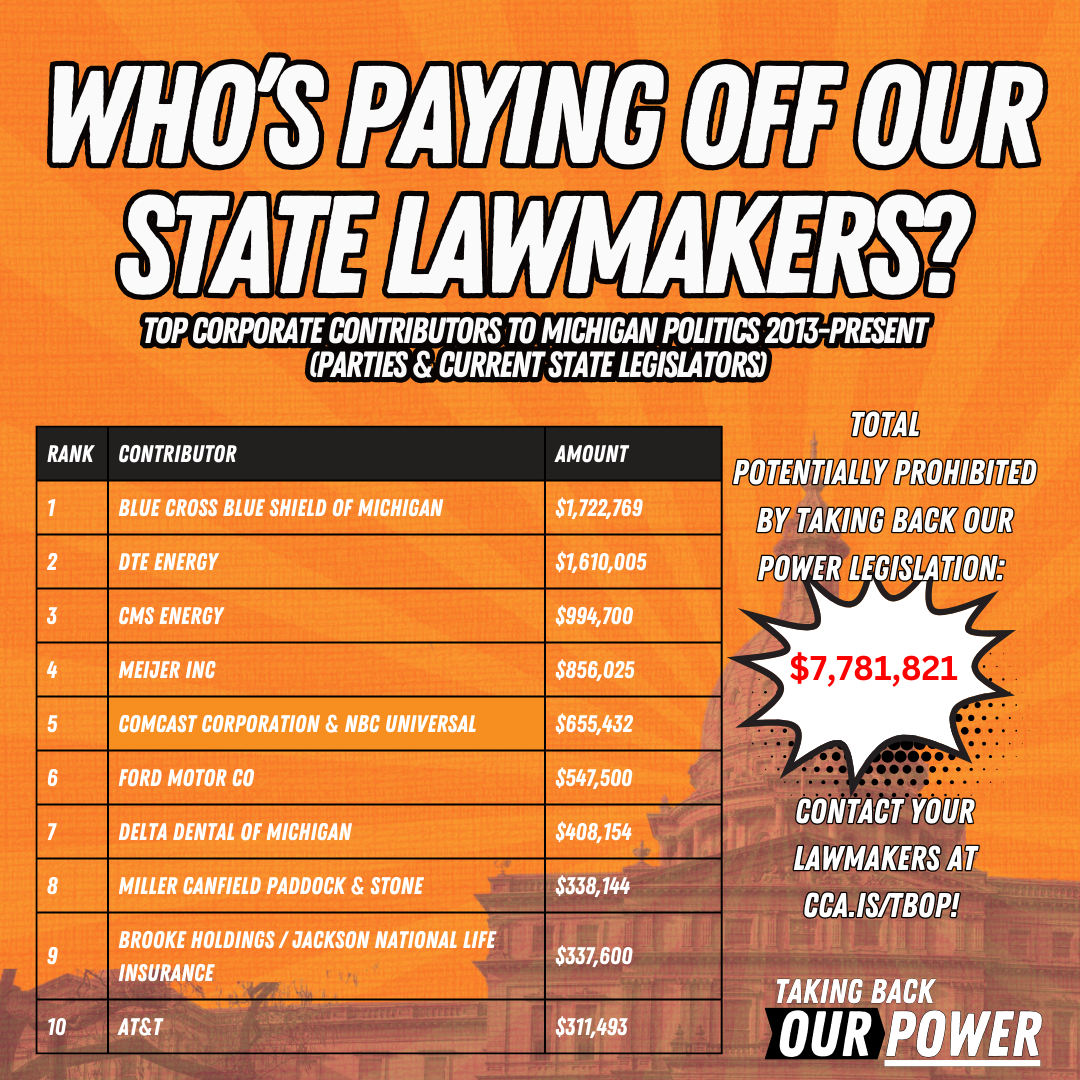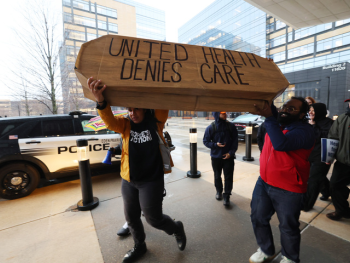News & Media
July 17, 2024
Download & Share




Ten Questions about Taking Back Our Power
How can we stop monopoly corporations and powerful government contractors from drowning out the voice of the people?
Because government contractors and regulated monopoly corporations have such direct incentives to buy their way out of accountability and corrode the public trust, the federal government, the Securities and Exchange Commission, and 15 US states require some form of limits on political contributions from government contractors and/or monopoly corporations. The State of Michigan has enacted this type of law before, and Federal Courts have affirmed that states are allowed to prohibit most or all political contributions to legislators and parties from corporate-controlled entities, company principals (including spouses and close family), and lobbyists of regulated monopolies or companies that contract with government entities.
Are my constituents supportive of Legislation to Take Back Our Power?
Yes, overwhelmingly, according to polling results released by Progress Michigan and Public Policy Polling. The survey found that 67% of respondents favor banning political contributions from regulated monopolies and corporations seeking government contracts. Support for this initiative surged to 76% when respondents were informed that regulated monopolies, such as DTE Energy and Consumers Energy, have used their disproportionate influence in Lansing to escape accountability and create the political context in which Michiganders now pay the highest electric rates in the Midwest for the worst power outages. Additionally, the survey found that there are major upsides for elected officials that support this initiative with almost no downside as 54% of respondents indicated they would be more likely to vote for a candidate who advocates for banning political contributions from these entities, while only 8% would be less likely.
What would a law to take back our power look like in Michigan?
The Taking Back Our Power coalition is advocating for Michigan legislation that limits the controlled entities and principals of regulated monopoly corporations and sizeable government contractors at the state, county, and local levels, from making contributions to: 1) state or local candidate committees; 2) PACs/Super PACs; 3) dark money 501(c)(4) groups controlled by candidates or affiliated with regulated monopoly corporations or government contractors; and 4) state or local party committees.
House Bills 5520, 5521, and a forthcoming bill currently in process with the Legislative Services Bureau achieve this as it pertains to regulated monopoly corporations and are endorsed by the Taking Back Our Power coalition. Our coalition is working to introduce companion legislation applying the same prohibitions on corporations seeking government contracts. The prohibitions would apply to contractors with $250,000 or more in aggregate contract awards, and would cover a period of 18 months before seeking or entering the contract, during the term of the contract, and 18 months after the termination of the contract. To comprehensively protect our democracy from corporations that directly profit from outsized influence over elected officials, the Taking Back Our Power coalition is advocating that both the utility-side and contractor-side bills be tie-barred together.
What entities would be impacted by this legislation?
With some exceptions (see below on recipients of grants, cities, counties, and public universities), the entities in this state-maintained list of vendors that receive government contracts through a procurement process would be affected by this legislation. Municipalities would have their own lists as well. In Michigan, state regulated monopolies that fall under the authority of the Michigan Public Service Commission like DTE, Consumers Energy, and International Transmission Co. would also fall under the prohibition.
Because money is fungible, and to preserve voters' faith in our democracy, it is important to close all loopholes available to these companies. Drawing from language in other state laws, as well as court opinions affirming these laws, the Taking Back Our Power coalition is advocating that Michigan legislation should include principals of these companies, including: the CEO or comparable officer; any member of the board of directors, or an individual who has an ownership interest of five per cent or more in the contractor; employees who are a president, treasurer, vice president, or officer; any employee who has managerial or discretionary responsibilities with respect to government affairs or a government contract; the spouse or a dependent child of an individual described in this section; a political committee (e.g. PAC) established or controlled by an individual described in this section or the business entity or nonprofit organization that is the state contractor or prospective state contractor; lobbying firms, their families, and PACs associated with these firms or their families; any subsidiaries directly or indirectly controlled by the contractor or prospective contractor; or by anyone acting on behalf of the individuals, funds, or entities described in this section. States that have taken half measures to address pay-to-play corruption have seen scandals that show us the need to close these loopholes (eg, Hawaii, Georgia, North Carolina).
What about recipients of grants?
No. Recipients of public grants do not go through the procurement process and are not included in the definition of government contractors or monopoly corporations.
What about cities, counties, and public universities?
No. Cities, counties, and public universities are governed by elected officials and would be excluded in the legislation.
Are lobbying, legal, or consulting firms affected?
The legislation we are advocating for would not impact lobbying, legal, or consulting activities or the hiring of such firms. We recognize these firms often do important work. The legislation would only stop such firms from making political contributions that could create the appearance of “buying” contracts or more favorable terms for themselves or their clients (contributions made before the law is enacted would not be considered). In other words, the legislation would allow hired firms to lobby and communicate their clients’ interests and policy perspectives to elected decision-makers, but hired firms would not be allowed to serve as a vehicle for wielding financial leverage on behalf of their clients while they’re doing it. This is an important provision that has been adopted in other jurisdictions and affirmed by federal courts because powerful companies have used lobbying pass-throughs to circumvent ethics laws. See this article for an example where Troutman Sanders, a law firm working for Georgia Power, allegedly served as a pass-through entity on behalf of their client. And in North Carolina, where registered lobbyists are prohibited from making campaign contributions, lobbyists are openly sidestepping the law by routing large donations through spouses and other employees at their firms.
Who monitors compliance?
The onus for compliance is on the companies and the procurement or regulatory authority. For example, if the state procurement office or Michigan Public Service Commission (MPSC) finds that a company has violated the rules, they can enter into a remedy process with the company. Candidates are not expected to monitor the activities of principals of corporations seeking state contracts or companies regulated by the MPSC and, under the proposed legislation, will not be involved in that process.
Would this legislation have mitigated the Lee Chatfield corruption scandal?
Yes. The most scandalous part of what has been revealed by AG Nessel’s Lee Chatfield investigation is how companies like DTE and Consumers Energy were allowed to deposit $80,000 to Chatfield’s 501(c)(4) organization, which was legally usable for Chatfield’s lavish travel and lifestyle. Nessel issued a challenge to the legislature on the need to reform our inadequate campaign finance laws, which this legislation addresses.
Who is in the Taking Back Our Power Coalition?
The Taking Back Our Power coalition currently includes Clean Water Action, Community Change Action, Detroit Action, Detroit Jews for Justice, Emergent Justice, Michigan Environmental Justice Coalition, Michigan League of Conservation Voters, Michigan United Action, MOSES Action, and Voters Not Politicians.
FEATURES & SERVICES
What could happen if we organize 3.5% of Michigan?
Project 3.5 is our plan to organize 3.5% of Michigan, tear down the barriers of inequality
and replace what remains with dignity and opportunity.
To accomplish this, we need motivated people ready to lead with effort and dollars.
This is your chance to become the leader you've always wanted to see.
Join our movement with an affordable monthly membership plan.
Ready to Do Something Now?
Join one of our projects!

Join "Taking Back our Power" and take a stand against money in Michigan politics
We are a coalition of working families in Michigan fighting to pass comprehensive state legislation to prevent regulated monopoly corporations and companies seeking government contracts from making political contributions. We can no longer let them buy their way out of accountability and drown out the voice of the people!
Join "Care Over Cost" and help us get people the healthcare coverage promised by their insurers
In Michigan and all across the country, our members are fighting individual care denials and are WINNING people the care they need--and paid fo! Together, we are working to transform our health care system to put Care Over Cost and people over profit.


Become a Relational Organizer
Relational organizing is defined as “preparing & supporting people to bring the power within their existing relationships to affect change.” In actuality is it turning a contact into a conversation and then into a person empowered to create change where they live.
Recent News & Media




